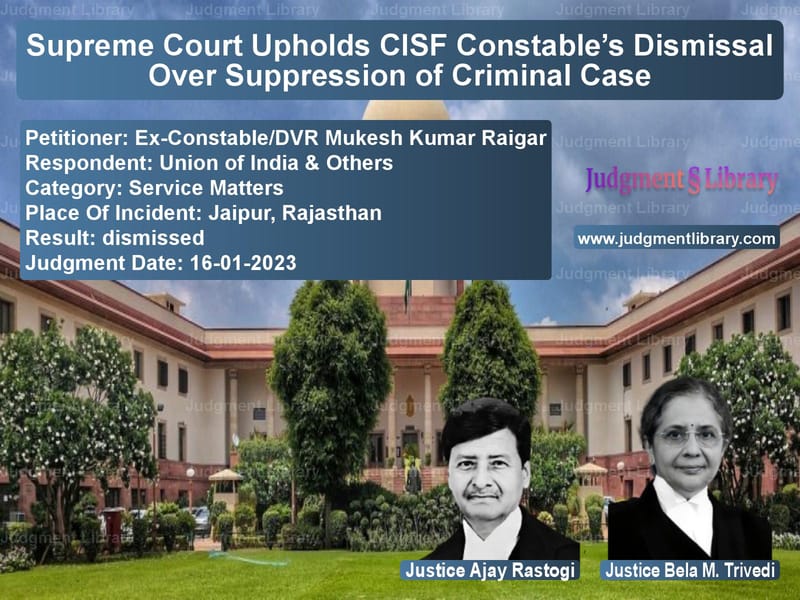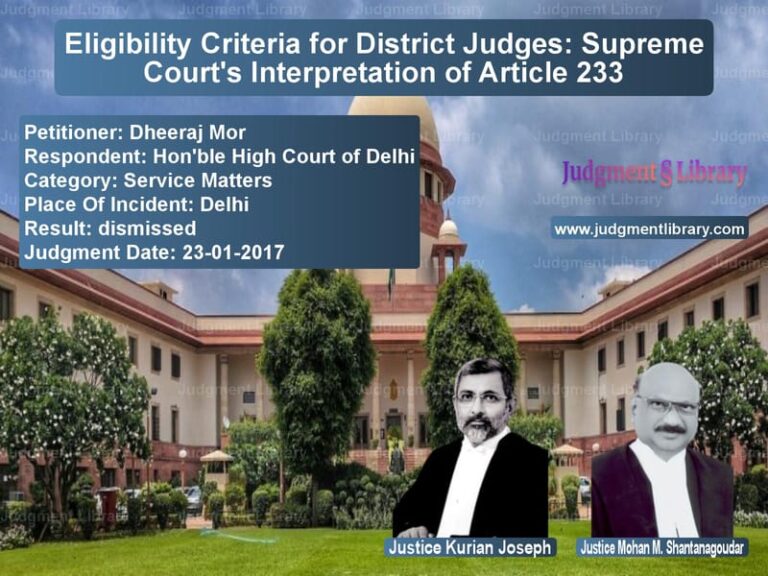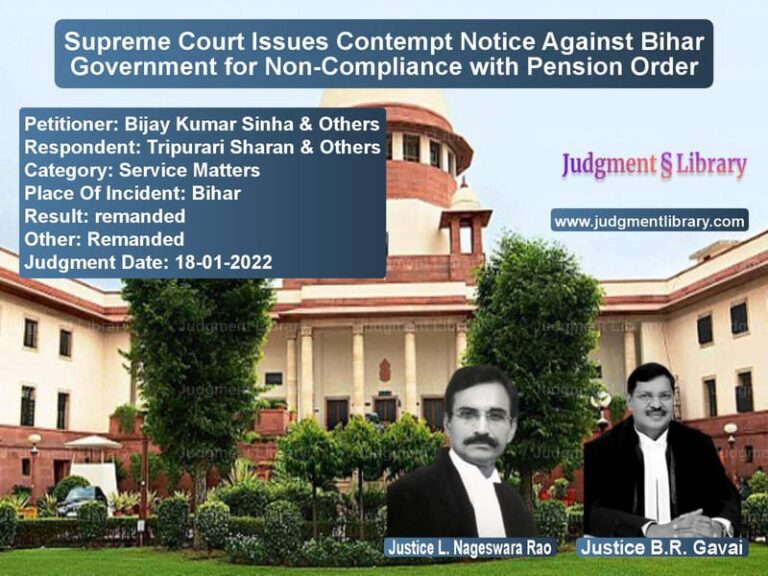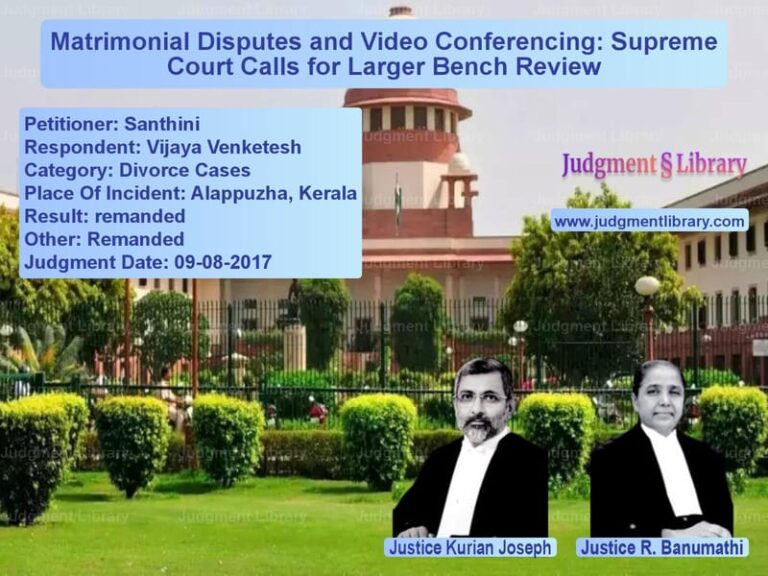Supreme Court Upholds CISF Constable’s Dismissal Over Suppression of Criminal Case
The case of Ex-Constable/DVR Mukesh Kumar Raigar v. Union of India & Others involves the dismissal of a CISF constable for failing to disclose his involvement in a criminal case during the recruitment process. The Supreme Court upheld the decision to remove him from service, emphasizing the importance of honesty and integrity in disciplined forces. This judgment clarifies the legal standards regarding background verification and suppression of material facts in employment matters.
Background of the Case
Mukesh Kumar Raigar was appointed as a constable in the Central Industrial Security Force (CISF) on November 3, 2007. During the verification process, he failed to disclose that he had been involved in a criminal case under Sections 323, 324, and 341 of the Indian Penal Code (IPC). The charge sheet had been filed against him before the competent court, and the case was pending at the time of his recruitment.
The CISF authorities later discovered this suppression of information and initiated departmental proceedings against him in April 2009. He admitted to the non-disclosure but claimed that the case was trivial and had been compromised between the parties. Initially, he was given a minor penalty of a one-stage reduction in pay. However, upon a suo motu review by higher authorities, a fresh departmental inquiry was conducted, resulting in his removal from service on March 9, 2010.
Timeline of Events:
- 2003: FIR registered against Raigar under Sections 323, 324, and 341 IPC.
- 2007: He was appointed as a CISF constable.
- 2009: His criminal background was discovered, leading to departmental proceedings.
- 2010: He was removed from service after a fresh departmental inquiry.
- 2012: He filed a writ petition before the Rajasthan High Court challenging his removal.
- 2018: The High Court’s Single Bench ruled in his favor, directing reinstatement.
- 2021: The Division Bench overturned the Single Bench ruling, upholding his dismissal.
- 2023: The Supreme Court affirmed the dismissal.
Key Legal Issues
1. Whether the Suppression of Criminal Proceedings Justified Dismissal?
Raigar argued that his criminal case was minor and had been resolved through a compromise. However, the Supreme Court held that:
- Any suppression of material facts in the verification form is a serious misconduct.
- Candidates seeking employment in disciplined forces are held to higher standards of integrity.
- The suppression of criminal antecedents, irrespective of the nature of the case, can justify removal from service.
2. Whether the Penalty of Dismissal was Disproportionate?
The petitioner contended that his punishment was excessive, given that his case did not involve moral turpitude. The Supreme Court rejected this argument, stating:
“The CISF, being an armed force of the Union of India, requires the highest standard of discipline. The deliberate suppression of criminal involvement is a serious breach of trust.”
3. Applicability of the Avtar Singh Judgment
Both sides relied on the Supreme Court’s ruling in Avtar Singh v. Union of India, which laid down guidelines on how employers should assess criminal antecedents in employment cases. The Supreme Court in this case reaffirmed the principle that:
- Non-disclosure of a criminal case, even if minor, can be a valid ground for termination.
- Employment in security forces demands higher scrutiny than civilian jobs.
Supreme Court’s Judgment
The Supreme Court ruled in favor of the CISF authorities, stating:
“The petitioner was rightly removed from service for failing to disclose material facts regarding his criminal antecedents. No interference is warranted.”
Implications of the Judgment
The Supreme Court’s ruling sets crucial legal principles regarding employment background verification:
- Strict Verification Norms for Disciplined Forces: The judgment reinforces the need for stringent background checks in security forces.
- Finality of Disciplinary Actions: The ruling affirms that once a valid disciplinary action is taken, courts should not interfere unless there is a violation of due process.
- Integrity in Government Jobs: It establishes that honesty in disclosing past criminal records is paramount for candidates seeking public employment.
Conclusion
The Supreme Court’s decision in Ex-Constable/DVR Mukesh Kumar Raigar v. Union of India underscores the importance of maintaining discipline and integrity in security forces. The ruling affirms that any concealment of criminal history, regardless of the severity of the offense, is grounds for termination. This case serves as a guiding precedent for government recruitment policies and emphasizes the critical need for transparency and honesty in public service employment.
Petitioner Name: Ex-Constable/DVR Mukesh Kumar Raigar.Respondent Name: Union of India & Others.Judgment By: Justice Ajay Rastogi, Justice Bela M. Trivedi.Place Of Incident: Jaipur, Rajasthan.Judgment Date: 16-01-2023.
Don’t miss out on the full details! Download the complete judgment in PDF format below and gain valuable insights instantly!
Download Judgment: ex-constabledvr-muk-vs-union-of-india-&-oth-supreme-court-of-india-judgment-dated-16-01-2023.pdf
Directly Download Judgment: Directly download this Judgment
See all petitions in Employment Disputes
See all petitions in Disciplinary Proceedings
See all petitions in Termination Cases
See all petitions in Public Sector Employees
See all petitions in Judgment by Ajay Rastogi
See all petitions in Judgment by Bela M. Trivedi
See all petitions in dismissed
See all petitions in supreme court of India judgments January 2023
See all petitions in 2023 judgments
See all posts in Service Matters Category
See all allowed petitions in Service Matters Category
See all Dismissed petitions in Service Matters Category
See all partially allowed petitions in Service Matters Category







